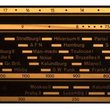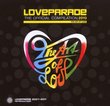| All Artists: Dmitry Shostakovich, Igor Stravinsky, Leonard Bernstein, English Bach Festival Percussion Ensemble, Members of the English Bach Festival Orchestra, Patricia Parker, Chicago Symphony Orchestra, Israel Philharmonic Orchestra, Vienna Philharmonic Orchestra, Boris Berman, Cyprien Katsaris, Homero Francesch, Krystian Zimerman, Martha Argerich, Anny Mory, John Mitchinson Title: Stravinsky, Shostakovich: Bernstein's Complete Recordings on Deutsche Grammophon [Box Set] Members Wishing: 0 Total Copies: 0 Label: Deutsche Grammophon Original Release Date: 1/1/2005 Re-Release Date: 11/8/2005 Album Type: Box set, Collector's Edition Genre: Classical Styles: Opera & Classical Vocal, Ballets & Dances, Ballets, Historical Periods, Modern, 20th, & 21st Century, Symphonies Number of Discs: 6 SwapaCD Credits: 6 UPCs: 028947751939, 028947751939 |
Search - Dmitry Shostakovich, Igor Stravinsky, Leonard Bernstein :: Stravinsky, Shostakovich: Bernstein's Complete Recordings on Deutsche Grammophon [Box Set]
![Stravinsky, Shostakovich: Bernstein's Complete Recordings on Deutsche Grammophon [Box Set]](https://nationalbookswap.com/cd//l/36/1936/6131936.jpg) | Dmitry Shostakovich, Igor Stravinsky, Leonard Bernstein Stravinsky, Shostakovich: Bernstein's Complete Recordings on Deutsche Grammophon [Box Set] Genre: Classical |
Larger Image |
CD DetailsSimilar CDs
|
CD ReviewsIrregular Stravinsky and Shostakovich jewels. Francisco Yanez Calvino | Santiago de Compostela, GALIZA, Spain. | 03/07/2006 (4 out of 5 stars) "DG is releasing some of the most interesting Bernstein's performances they have launched in other series or kept in their catalogue. This 6 CDs box offers the works by two Russian composers Bernstein loved very much and with whom he had an enormous feeling and empathy. Those are Igor Stravinsky and Dimitri Shostakovich. First of all DSCH, that is the really best in this box... Symphonies 1 & 7 are the only recording, as far as I know, Leonard Bernstein did with the Chicago Symphony Orchestra, a group of players with a very long tradition in the American music and with a great technical playing good enough to play quite all the repertoires. Like in the case of his Mahler's 9 with Berlin, Bernstein only recording with this orchestra is a miracle that happens once and never more, because of many reasons, the first one because this is a live recording in the Medinah Temple and the emotions felt in this CD could not happen again. I always thought Chicago is a very appropriate orchestra to play DSCH's music, because of the characteristics of the orchestra and of Shostakovich's music, very hard and very sensitive at the same time. One of the symphonies it's better to this couple DSCH & CSO is the 7th that it's not the most complex between DSCH's works, from the technical and musical point of view, but that demands a great and powerful orchestral response, something you can listen perfectly in this amazing recording, in which CSO gives his best, with a baton that understand very well the score, as far as he can... I think no one could understand completely the meaning of the Leningrad not being in the place of the siege or in the scenario described in the double-program of the symphony, probably linked to the oppression Stalin made with his politics to the pre-communist life of Saint Petersburg. I remember Goethe's words, when he said that reading a book is more complex than reading a book. Of course good Goethe talked about understanding a work, and Lenny, even not living that situation gives us a description of the fears, sadness, oppression, etc, really convincing from the very first bar. Symphony Nº1 is a piece from DSCH's conservatoire years, from 1926, when the composer was only 19 years old and he was suffering a very disturbing economical situation, after his father's death and in the poor CCCP after the Revolution and the Civil War. It's known DSCH had to work in a cinema, under very hard conditions to eat, and that Glazunov took care of having some official assistance for his conservatoire pupil in order to Dimitri gave attention only to composer. The piece is not a great work like symphonies 5, 7, 8, 10, 13... but it shows some details and the personality of the maestro clearly. It was a great success from the same premiere and it made appear Shostakovich as the emergent figure of the new soviet composers, formed in the communist conservatoire... That was what the regime said, because in fact Leningrad conservatoire was mainly what it was before communist regime. Leonard Bernstein performance of this symphony is a glory from all the points of view, perfectly played and recorded, the piece is fresh, full of tension and emotion, and even that parts not so fine orchestrated shine with real genius. The fourth and final movement is specially outstanding and the way the symphony ends is so good that sometimes I repeat the last minute when it finish. I really don't know any other version played with this very deep conviction on CD. Seventh Symphony "Leningrad" is OUTSTANDING too, in every movement the orchestral playing and Lenny's conducting is breathtaking. The gigantic crescendo of the first movement is really a monument in the way Lenny control the dynamics perfectly, having an end that is really impossible to repeat, with the scales of the metals and drums full of terror, like watching the face of the death in front of you, in front of the city. Central movements are wonderfully described too, the dynamics and the control of the tempo is amazing, as we listen in the second movement, a clear example of alternation between fortissimos and pianissimos, as between an atmosphere were everything is like suspended in fears and moments of pain. The last movement is another Bernstein's `show', because of the way he proclaims the victory of the initial motif, which we could say is not completely affirmed in order to create that two-senses possibilities in the symphony reading. From the very dark beginning of the movement Lenny creates a crescendo that finally leads an explosion in the last bars, outstanding one more time. The recording is fine, very present, full of body but not so clean like his recordings with Vienna in the 80's (I think about his DSCH's 6 & 9, for example; too on this CDs box), but it worth very, VERY, very much. I could not say this is the only possible version, as I read in other reviews. I know about 5 or 6 performances (Rostropovich, Jansons, Haitink, Barshai...), apart from some others life, and of course this is the one I like much more, but not the only possibility, I try to discover always new ways in art, specially in music performances. Jansons' version in EMI is very good too, and we can not forget DSCH music always use to ask for the soviet performances, which are a very different way of understanding the works generally. Kondrashin or Rozhdestvensky shows another ways too. If Symphonies 1 & 7 with Chicago are good, Symphonies 6 & 9 with Vienna are extraordinary too. I have read sometimes critics about the slow tempo Bernstein used, but I've to say this tempo brings new views and conceptions about these marvellous scores. First movement of Symphony Nº6 sounds deep and spacious, technically perfect like the rest of the performance. Second and third movements are really amazing, hard to believe because of the incredible level of the Vienna players, in a tempo that allows you to listen all the instruments and musical phrases perfectly defined. Symphony Nº9 performed by Bernstein was said it is too much triumphal... I really like it very much in the way it's played, like the Sixth marvellous form any point of view. Stravinsky is good, but the orchestra is not at the same level than CSO or WP. Petrouchka is very, very good and very theatrical. Le Sacre is savage, furious and very interesting. The most important works are, in this way, those better conducted by Lenny and best played by the Israel Orchestra. We have to mention Noces and Mass, not very usual on CD and with fine performances on Bernstein hands. Sound is better in DSCH recordings, as in Stravinsky there are some works (Noces, Mass) in ADD recordings. Anyway, a very, VERY interesting 6 CDs Box which worth for all those who don't have these Shostakovich performances and for those who want to have good performances of some of the best Stravinsky's works. " Not the best of Bernstein, but there are some gems Santa Fe Listener | Santa Fe, NM USA | 01/21/2006 (4 out of 5 stars) "This DG bargain box of 6 CDs brings together recordings of Stravinsky and Shostakovich that, with few exceptions, are remakes of considerably better earlier ones. The Stravinsky works mostly date from 1982 with the Israel Phil. They would be considered quite good except that the earlier NY Phil. recordings are great. The same holds true for the Shostakovich, though perhaps not to such an extent, since the Vienna Phil. plays so spectacularly on two of them. As a quick overview: Stravinsky: The best readings here are the Firebird Suite from Tel Aviv and a pairing of Les Noces and Mass from London in 1977. The last two arena't remakes. The Isael account of Le Sacre is certainly very good in spots but rather slack in other spots. The little-heard Scenes de Ballet gets an elegant, sinuous reading with not a trace of excessive underlining, while the Sym. in Three Movements is plodding (neither of these is a remake). The Petrushka is dull and uninvolving. In all, more than half of the music on these three CDs stands up very well. Shostakovich: The best is Sym. #9 with the marvelous Vienna Phil. from 1985, a cheerful, refined reading that eschews darkness. The Sym. #6 from the same source, but a year earlier, sounds noncommittal and underplayed. Sym. #1 and 7 come from 1988, quite late in Bernstein's career. The Chicago Sym. plays elegantly in the First, but everything seems a bit tired. The Seventh was a Bernstein specialty; he had made a huge hit recorded and is almost as good, though lacking the uncanny communiction of the first version. I found the playing too refined at times, but Bernstein never played this piece for its potential savagery. In all, this Seventh and the Ninth have worn the best. All the sonics here are exceptionally good. Bernstein got good analog sound from Columbia when he was with the NY Phil, but these digital remasterings leave those old versions in the dust. It's a trade-off, then, since as an interpreter Bernstein never excelled his youthful self in these works." Always Good to Study Bernstein Again Grady Harp | Los Angeles, CA United States | 05/08/2006 (5 out of 5 stars) "Now that Leonard Bernstein has entered the canonization of American conductors it is healthy to review his recorded output to understand the impact he had on classical music in America (and the world, for that matter). Not all of Bernstein's recordings are worthy of placement in the upper echelon of the library, but his approaches to scores are always deserving of attention. This boxed set (six CDs) from DGG represents all of the recordings Bernstein made with that prestigious recording company and while not all of them are his best, they each carry a halo of growth and altered approach Bernstein offers after his long years of conducting.
Included in the box set are Shostakovich Symphonies 1 and 7 with the Chicago Symphony, and 6 and 9 with the Vienna Philharmonic Orchestra. Both ensembles are first rate and Bernstein elicits fine playing from them. If he dwells a bit long in the tooth on the languid portions of Shostakovich, his other recordings give spikier accounts. For the works of Stravinsky (long associated with Bernstein until the 'new breed' of conductors usurped that throne) Bernstein conducts the Israel Philharmonic Orchestra, an orchestra over which he held great authority, in fine performances of the second suite from 'L'oiseau de feu', the 1947 version of 'Petrushka', 'Pulcinella', a varied 'Le Sacre du printemps', the 'Symphony in C' and 'Symphony in Three Movements'. The performances include some of his most insightful conducting as well as some of his least involved! Fortunately DGG includes Bernstein's superb performance of 'Les Noces' for vocal soloists, chorus, 4 pianos & percussion with John Mitchinson, English Bach Festival Percussion Ensemble, Homero Francesch, Paul Hudson, Martha Argerich (!), Krystian Zimerman (!), Patricia Parker, Cyprien Katsaris, Anny Mory in a rhythmically secure, propulsively conducted and controlled manner. Using the same forces he encores the 'Mass, for chorus & double wind quintet', a work still too infrequently performed today. There is always something to learn from hearing Bernstein conduct (and talk! - remember those superb Sunday televised encounters?) and it is to DGG's credit to present this wide range of recordings in one set. Grady Harp, May 06" |





